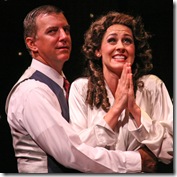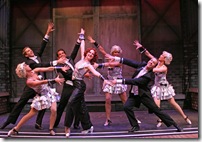With a cast almost uniformly transplanted from this summer’s Surflight Theatre production (and starring one of my favorite local actors, Scott McGowan), things looked to be promising. Unfortunately, the current iteration of Mack and Mabel feels as rushed as Sennet’s two reelers starring Normand (always in trouble) or the clumsy, clueless Keystone Kops. And while the actors are supremely talented singers and dancers, director Hafen fails to coax nuanced performances from them, making their characters more cartoonish than real.
 Told from the vantage point of an older Sennet reminiscing about his career and collaboration with Normand, the plot recounts their serendipitous meeting when Normand delivers a sandwich from a local Brooklyn deli to the set of Sennet’s Keystone Studios. Taken by her feisty freshness and ability to clown around, he convinces her to join his company, which she does reluctantly. Sennet keeps his protégé busy making 60 two-reelers a week, directing her by counting (“on 1 you take the plate, on 2 you turn…”) and paying her very little (and sometimes nothing). Mabel doesn’t seem to mind, for she’s sweet on Mack, despite his lack of interest in romance. When the studio relocates to Hollywood, the two continue to be involved—without strings—but Mabel soon chafes at the silly roles she’s given, and when she catches Mack with her friend May Bush, she leaves and takes up with another director who promises to make her a dramatic star. After a five-year hiatus, Mabel returns, but when Mack ignores her to make Keystone Kops comedies, she leaves again, never to return.
Told from the vantage point of an older Sennet reminiscing about his career and collaboration with Normand, the plot recounts their serendipitous meeting when Normand delivers a sandwich from a local Brooklyn deli to the set of Sennet’s Keystone Studios. Taken by her feisty freshness and ability to clown around, he convinces her to join his company, which she does reluctantly. Sennet keeps his protégé busy making 60 two-reelers a week, directing her by counting (“on 1 you take the plate, on 2 you turn…”) and paying her very little (and sometimes nothing). Mabel doesn’t seem to mind, for she’s sweet on Mack, despite his lack of interest in romance. When the studio relocates to Hollywood, the two continue to be involved—without strings—but Mabel soon chafes at the silly roles she’s given, and when she catches Mack with her friend May Bush, she leaves and takes up with another director who promises to make her a dramatic star. After a five-year hiatus, Mabel returns, but when Mack ignores her to make Keystone Kops comedies, she leaves again, never to return.  Mack and Mabel brims with those Jerry Herman musical numbers we’ve come to love from such hits of his like Mame, La Cage aux Folles and Hello Dolly. Scott McGowan projects Sennet’s moxie in “Movies Were Movies” and “I Want to Make the World Laugh,” perfect songs for a guy who grew up on a dirt farm in Canada and made up scenes to counteract the boredom of repetitive chores. After all, this is the filmmaker who invented the bathing beauties and the inept cops. And “Tap Your Troubles Away” shows that Sennet’s acumen preceded those Busby Berkeley dance numbers. Hafen projects scenes from Sennet’s films on the back wall of the stage so we get a real feeling for his genius. And there are times when the frantic, even jerky, movement of early movies suits the action, much to the audience’s delight.
Mack and Mabel brims with those Jerry Herman musical numbers we’ve come to love from such hits of his like Mame, La Cage aux Folles and Hello Dolly. Scott McGowan projects Sennet’s moxie in “Movies Were Movies” and “I Want to Make the World Laugh,” perfect songs for a guy who grew up on a dirt farm in Canada and made up scenes to counteract the boredom of repetitive chores. After all, this is the filmmaker who invented the bathing beauties and the inept cops. And “Tap Your Troubles Away” shows that Sennet’s acumen preceded those Busby Berkeley dance numbers. Hafen projects scenes from Sennet’s films on the back wall of the stage so we get a real feeling for his genius. And there are times when the frantic, even jerky, movement of early movies suits the action, much to the audience’s delight. But in real life neither Mack nor Mabel were likeable, sympathetic characters. Both were ambitious climbers, he more self-absorbed than she, but there were times when the actors could have let us see a softer side. For instance, McGowan barrels cheerfully through “I Won’t Send Roses,” wherein he sets the “rules” for a relationship with Mabel. A little too cheerfully for us to understand just why she’d go along with the situation. And later, when she leaves a second time, Larissa Klinger as Mabel merely sings the notes to “Time Heals Everything (but loving you)” at a steady clip and without any emotion. This sad song needs to be acted, not just warbled. She should listen to Barbara Cook’s rendition for some pointers on how to do this.
My other quibble has to do with the sound. Ryan Gravett has miked all the actors, so that no one has to project his or her voice and all volumes are the same. “Wherever He Ain’t,” sung by Mabel, was ear-splitting.
As noted before, the entire cast certainly has the chops to sing and dance. Klinger is beautiful to look at and has a lovely voice. Her saucer eyes and ability to pratfall embody the real Mabel Normand and her onscreen antics. Abbey Elliott, as Mack’s other leading lady Lottie Ames, was equally as terrific, especially in the big numbers, “Big Time” and “Tap Your Troubles Away.” Daniel Vissers turns in a terrific performance as Frank Wyman, the gofer who becomes a writer (Frank Capra, to boot). The rest of the ensemble plays a variety of roles and provide fine support.
This production of Mack and Mabel (and maybe the original too) is too frantic to be absorbing, too superficial to be engrossing. Perhaps it’s the fault of the script, but Hafen’s direction doesn’t leave time to address important issues. Mabel’s drinking and drugging are hinted at but relatively ignored, as is her involvement in the murder of her beau director Desmond Taylor (she was involved in another murder too). And the “Happy Ending” is a fantasy, but you’d never know it from the Bickford’s final upbeat number. Mabel never returns to Mack. He merely imagines she does.
Now all of this is not to say that you won’t have a toe-tapping good time at the Bickford Theatre’s production of Mack and Mabel. The singing and dancing are terrific, and the love affair proceeds like a ride on a rollercoaster with its ups and downs and twists and turns. But you won’t learn much about Mack and Mabel as people, and that’s too bad.
Mack and Mabel will be performed Thursdays at 2 PM, Fridays and Saturday s at 8 PM, and Sunday s at 2 PM through October 17. The Bickford Theatre is located within the Morris Museum and offers free parking and full accessibility. For information or tickets, call the box office at 973.971.3706 or online at http://www.bickfordtheatre.org/.